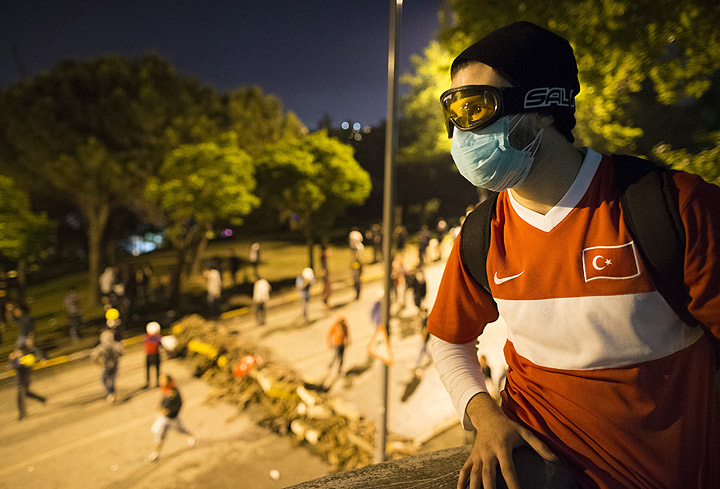VANCOUVER – A major Turkish mobile network operator has denied claims it was ordered to block access to its network at the scene of a massive protest in Istanbul.

According to the English-language website WorldBulletin.net, Turkcell said it has at no time received a government request to cut off access to its mobile networks, despite claims on social media to the contrary.
TechCrunch reported on Saturday, Facebook and Twitter were nearly impossible to access, in Istanbul and other areas, and many believed the government had “throttled” internet access in an attempt to keep information flowing from the scenes of anti-government rallies.
As protests continued to grow over the weekend, Turkey’s prime minister criticized social media.
In response to how the Twitter is being used to share information among Turkish protesters, Prime Minster Recep Tayyip Erdogan called the social media tool “a menace.”
Read more: Turkish Prime Minister dismisses protests against his government
Peaceful protests turned into clashes with police last week after authorities tried to quash a rally, against the development of a shopping centre in Istanbul’s Gezi Park, by firing tear gas and water cannons on demonstrators.
Erdogan’s comments came after some of the country’s news stations reportedly opted not to show scenes of the protests and clashes in Istanbul, and beyond.
While you may not see the images of wounded protesters and mass rallies broadcast on Turkish television, Tumblr, Twitter and the question-answer blogging site Quora are being used to aggregate information and images from the protest scenes.
An analysis of Turkish tweets on Monday suggested there were as many as 100,000 tweets an hour, at points between Saturday and Monday, using protest-related hashtags.
The overwhelming majority of the tweets — as much as 85 per cent – were geocoded in Turkey, NYU’s Social Media and Political Participation (SMaPP) laboratory reported.
Read more: Supporters turn to Quora to spread word about Turkey protests
There is no question that social media is once again a driving force in a popular uprising. But, comparisons to how it was used during 2011 uprisings in the Arab world — or even during Occupy Wall Street — aren’t entirely accurate.
Zeynep Tufekci, a fellow at Princeton’s Centre for Information Technology Policy and an assistant professor at the University of North Carolina, has been monitoring the social media interaction throughout the protests.
Much of the news that has been shared over social media has been accurate and filled in the information gap left by mainstream broadcasters, she said in a phone interview with Global News.
She attributes the Turkish protest coverage blackout to intimidation of journalists from both the government and media corporations protecting their business interests, rather than a flat out blackout on coverage.
“At one point the Turkish channel, CNN Turkey, was showing cooking shows and penguins and dolphins and everything, while CNN International was covering the protests in Turkey,” she said.
The way in which people rallying in Turkish streets are using the various forums to get information out is quite similar to what was seen in Egypt two years ago, for example, Tufekci explained.
A lot of the Twitter traffic surrounding the Egyptian protests came from outside the country’s borders – about 30 per cent was domestic, SMaPP reported. (As mentioned above, about 85 per cent of the tweets using protest-related hashtags are geocoded to Turkey.)
But, the increased social media traffic in Turkey doesn’t necessarily indicate the anti-government protests are strong enough to force a change in government, as was the case in Egypt.
Turkey is a much more developed country. So, it’s only logical that there would be more online interaction, she said.
“I don’t think it’s playing a different role in Turkey versus Egypt, except in Turkey it’s more widespread, compared to Egypt, because of the level of development in the country,” she said.
Gallery: Turkish protests enter 4th day
Twitter was widely credited as being a crucial tool in organizing the protests that led to Hosni Mubarak leaving office.
Turkey’s current government was democratically elected in 2011 — as opposed to Mubark’s 30-year autocratic rule — with the support of about half of the country’s population. That makes this a much more polarized situation than Egypt, she said.
Those that favour the government are also engaging in the discussion on social media, she added.
“Turkey is a large country. Of course there are a lot more tweets than in Egypt,” she said. “You need to normalize that by the number of people in the world on Twitter. If you don’t do that, comparing Egyptian tweets versus Turkish tweets, as absolute numbers, it doesn’t actually tell you something.”
Tufekci also said reports suggesting the government “throttled” Facebook and Twitter, to prevent the spread of information, were incorrect. Internet service providers were just overloaded by all of the activity, she said.


Comments